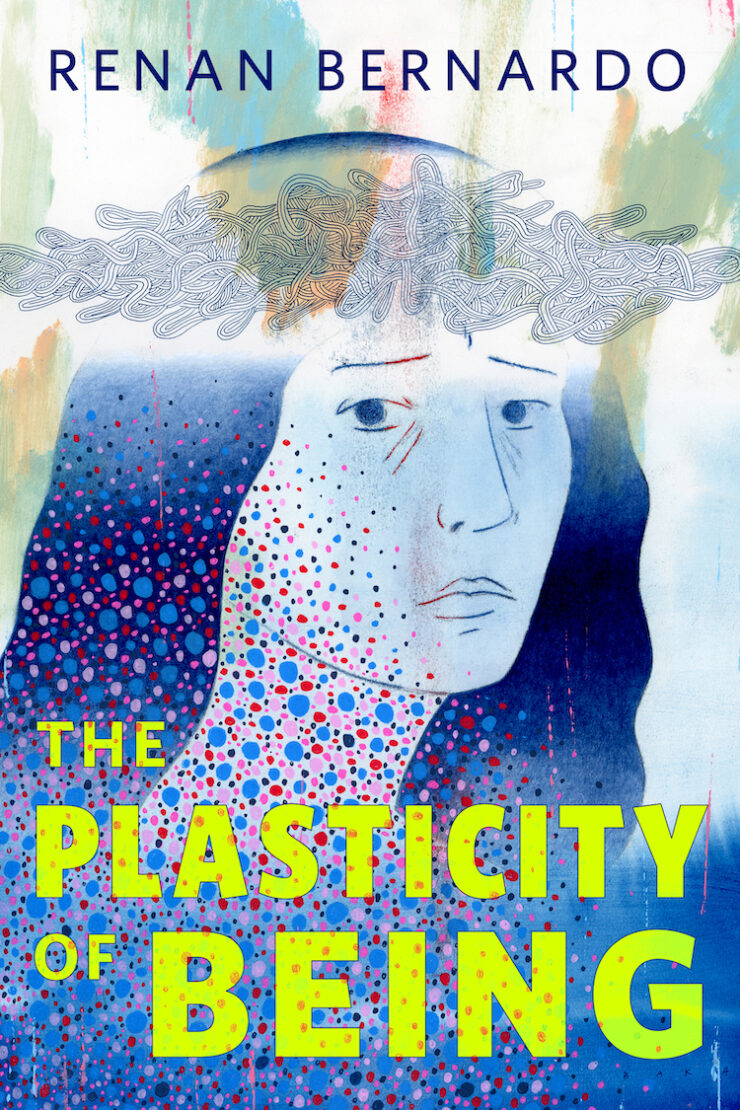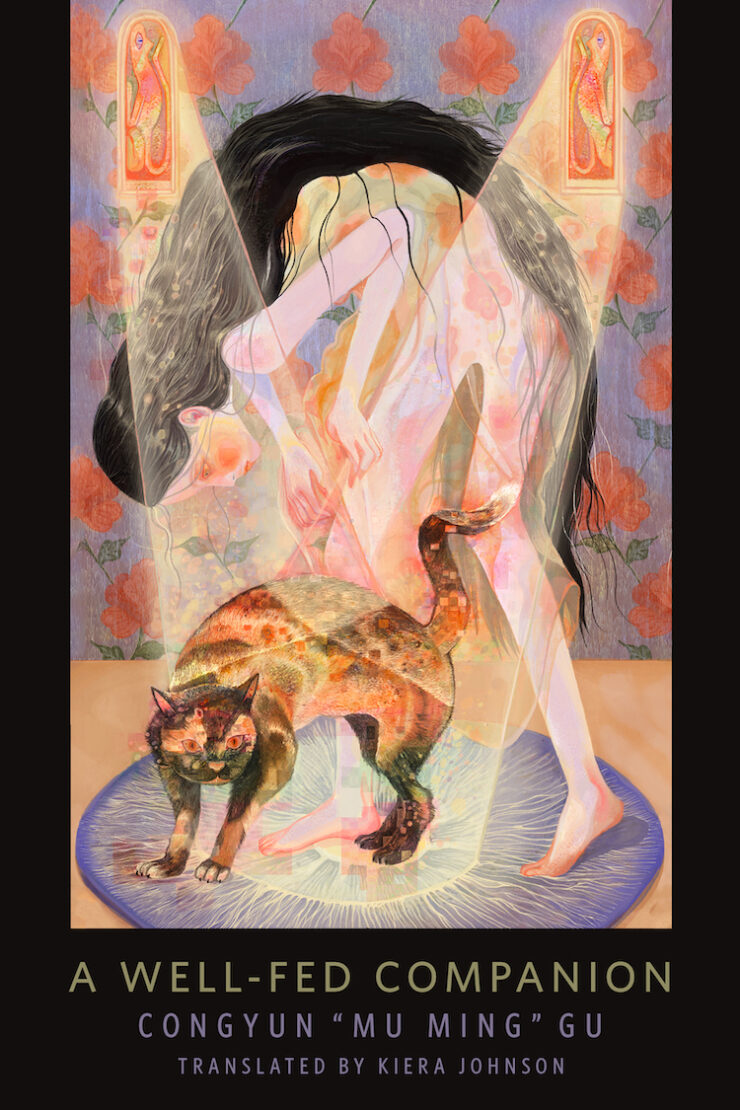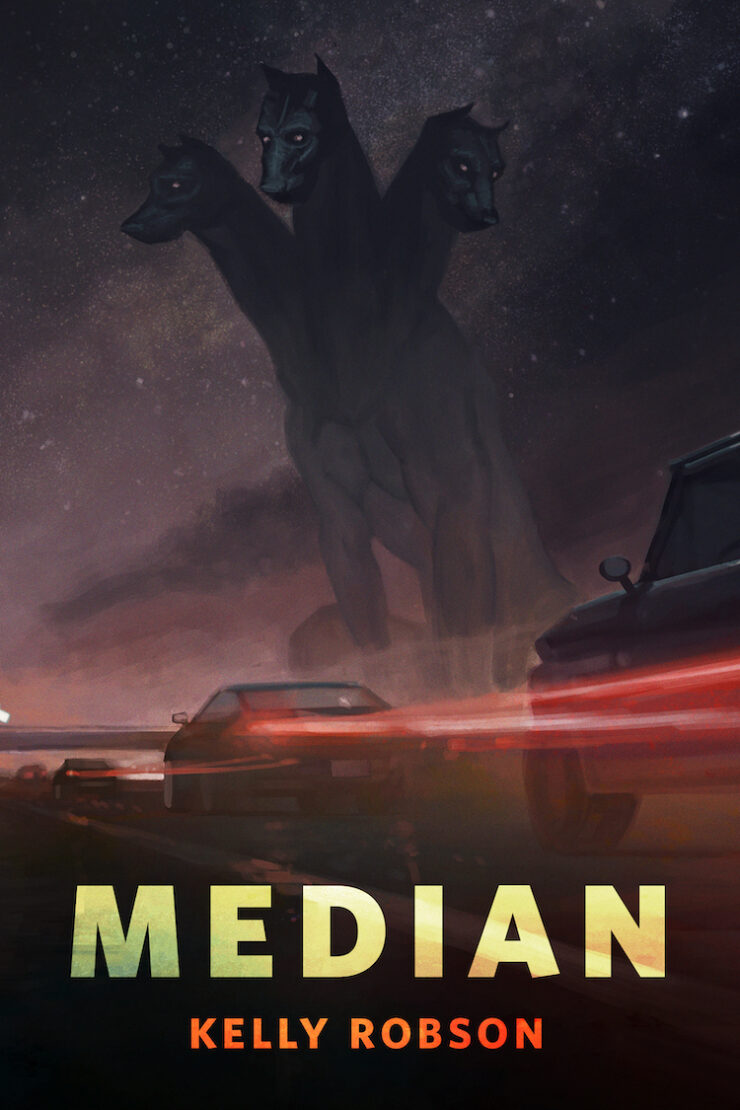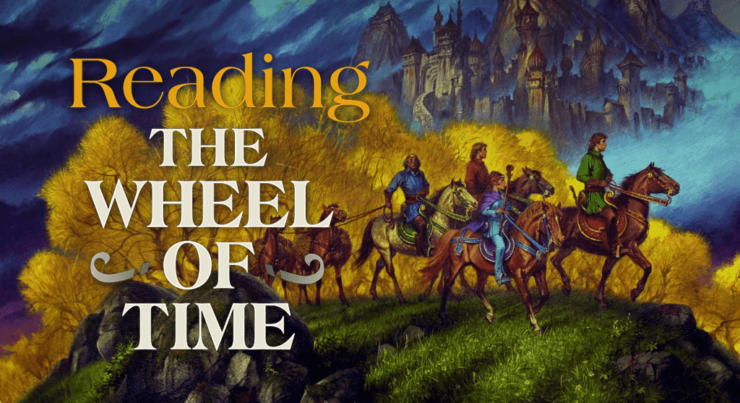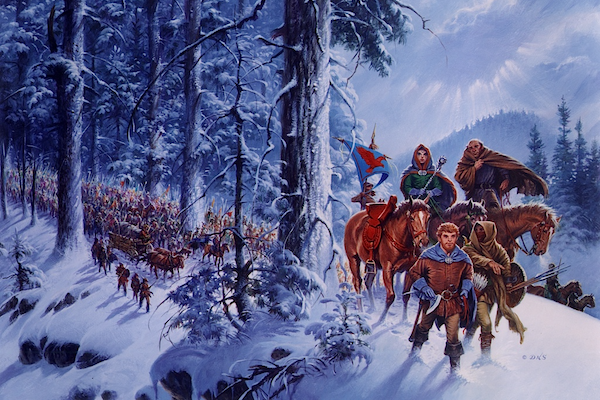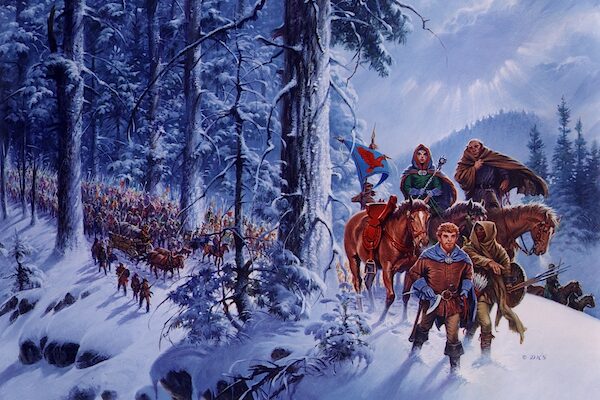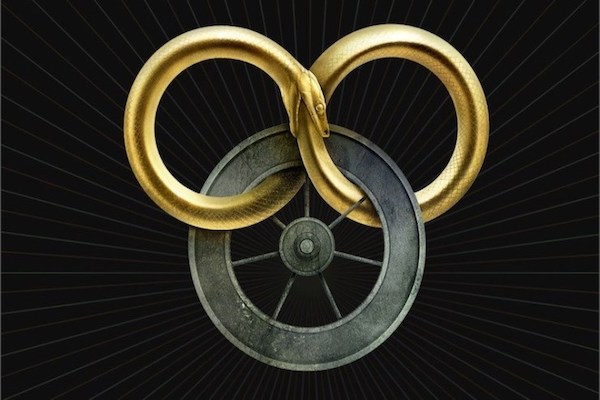Do you all ever do that thing when watching movies or television where you cheer when someone drops the title of the film or episode at a particularly dramatic moment of the plot? No? Just me and my weird friends? Well, I definitely gave a little whoop when I read the opening line of Chapter 15 of New Spring.
The air of Kandor held the sharpness of new spring when Lan returned to the lands where he had always known he would die.
There it is! Did you catch it? Everyone take a shot!
Anyway, this week we’re covering Chapter 15 and 16, in which Lan and Bukama return to the Borderlands and Lan finds out that he’s not going to be able to get back to his private war quite as quickly as he had hoped. Also we learn even more about why Lan’s life is depressing as heck. (A content note to our readers: This post contains discussion of depression, underage sex, and statutory rape.)
Lan and Bukama arrive in Kandor, and Lan finds himself noting the cold and wondering if being in the south has softened him too much. The two men, leading their mounts and packhorse, attract stares from the many farmers, merchants, and other travelers entering Canluum via the wide main road, which Lan ignores.
The hadori drew eyes. Especially here in the Borderlands, where people had some idea what it meant.
Bukama stops muttering about his horse’s injured hoof and having to walk, complaining instead about the wide berth they are being given. Despite the fact that it was he who convinced Lan to take a break, he grew grumpier the longer they stayed in the south. Lan doesn’t say anything about the reputation surrounding men who wear the hadori, and Bukama shifts to wondering about a bed and a meal for the night. Lan, meanwhile, finds his attention continually swinging north, imagining he can feel the corruption of the Blight. The pull of that place on him had grown stronger every day he was in the south.
Four nations bordered the Blight, but his war covered the length of it, from the Aryth Ocean to the Spine of the World. One place to meet death was as good as another. He was almost home. Almost back to the Blight. He had been away too long.
When they come to the city gate, however, they notice sharp looks from the guards, and no recognition for their faces. This isn’t surprising, as a great many men could die in two years in the Borderlands, but Lan notices that Bukama has gone silent. He urges him to relax, and Bukama replies testily that he never starts trouble.
Suddenly they are recognized by a young guard, perhaps a year or two younger than Lan, who greets him in surprise, saying that they have heard he died fighting Aiel. He bows deeply, with the words, “Tai’shar Malkier! I stand ready, Majesty.”
Buy the Book
The Eye of the World: Book One of The Wheel of Time
Lan demurs that he is not a king, but Bukama takes offense, asking the guard what right he has to claim to be Malkieri, given his short, unbound hair and the fact that he is wearing the emblem of a Kandori lord. Some of the other guards start towards them, but pause when Lan lets go of Cat Dancer’s reins. They know who he is, now, and that a warhorse is a dangerous weapon.
An officer, grey haired and scarred, comes out of the guard house. Lan recognizes Alin Seroku, who looks as surprised to see Lan as any of the others. He greets Lan cordially, blessing the memory of Lan’s parents and telling him that he’s always welcome. He also eyes Bukama, however, and plants himself in front of the gate in a very deliberate way. He goes on to explain that the city is on edge, both because of the rumors of a man channeling and because there have been murders in the street, even in broad daylight. Lan nods in acknowledgment, and answers that they intend to rest in the city for a few days before riding north. Seroku seems surprised, and Lan wonders what answer he expected.
They are both even more surprised when Bukama announces that the fault in the exchange is his, and pledges on his mother’s name not to draw his sword inside Canluum’s walls. But after a moment of shock, Seroku steps aside and welcomes them both by name. They exchange formal words, and then Bukama heads into the city, stone-faced and not waiting for Lan.
The city is bustling, and Lan notes several Aes Sedai in the crowd, their ageless faces making them stand out as the other people give them space. Lan considers that you might have gone a year without seeing one, even in the Borderlands, but they seem to be everywhere since the Amyrlin Seat died. He wonders if it’s because of the rumors of a man channeling.
He kept his eyes away from them, walked on quickly to avoid notice. The hadori could be enough to attract the interest of a sister seeking a Warder. Supposedly, they asked before bonding a man, but he knew several who had taken that bond, and every time it had come as a surprise. Who would give up his freedom to trot at an Aes Sedai’s heels unless there was more to it than asking?
Lan also notes, with some concern, that Bukama has no apparent reaction to the women wearing lace veils—a strong departure from custom even though the lace is sheer enough that their eyes can easily be seen—or to passing other Malkieri wearing their hair short and without the hadori. He realizes that they are making straight for the Stag’s Stand, the tall hill on which sits Lord Marcasiev’s “fortress-like” palace, surrounded by terraces and the homes of lesser lords and ladies. Lan will find a warm welcome on any one of those terraces, but reflects that it might be more attention than he wants right now. He doesn’t want to share stories of his “adventures,” to have young men ask to accompany him into the Blight or women vying to share his bed.
Plus, he’ll see other Malkieri who no longer keep to the customs of their people, and while Lan feels he can “ignore the false smiles while they named him al’Lan Dai Shan,” he’s concerned about Bukama’s reaction. The man will keep his oath, but he’s dangerous enough with fists alone to maim someone. So he turns aside, pointing out that Lord Marcasiev will keep them for a week or more with ceremony, and given the current mood in the city might be just as happy if Lan didn’t show up on his doorstep. Bukama follows without his usual complaining, and Lan is concerned that he will have to find a way to restore both of their edges.
They make their way into the more working-class part of town, known as the Deeps. Lan tucks his money under his shirt after the second time he feels someone trying to steal it, and they start trying to find rooms at an inn. But everything is full, and Bukama’s starting to mutter about a bed in a hayloft when they stop at the fourth inn, The Blue Rose. As soon as the innkeeper catches sight of them, she walks right up to Bukama and drags him down by the ears to kiss him. Even given the normal forthrightness of Kandori women, Lan is pretty surprised at the intensity and length of the kiss, right there in front of the entire common room. When she finally releases him Bukama greets her by name, Racelle, only to get punched in the face, upbraided for being out of contact for six years, and then kissed again.
Lan is greeted by his second oldest friend after Bukama, Ryne Venamar, who remarks that Mistress Arovni might find Bukama a room somewhere. The two go to a table to talk, and are served spiced wine by a serving maid named Lira who immediately propositions Lan. He tries to demur, saying she is honoring him too much.
“By tomorrow,” she announced in a throaty voice, and loudly, “I’ll have honored you till your knees won’t hold you up.” Raucous laughter flared at the tables around them.
Ryne gives her a coin and sends her off before Lan can get out of the situation, remarking that maybe he should try some of Lan’s “coy modesty” that seems to work so well with women. Lan starts to answer and then gives up the idea. Ryne was mostly raised in Arafel, and his customs are different. Lan, on the other hand, was raised in Shienar by Bukama and some others who held fast to Malkieri ways. There is nothing shy or retiring about how Lan acts in bed, but custom dictates that the woman chooses when to enter or leave that bed. He notes people staring at him and whispering to each other, and assumes they are wondering if there will be trouble over Lira.
Ryne tells Lan that he hadn’t expected to see him there, and Lan tells him that he shouldn’t have listened to the rumors of his death. Ryne dismisses the danger of the Aiel, and explains that he expected Lan “to be wherever Edeyn Arrel is. Chachin, now, I hear.” That catches Lan’s attention, and upon questioning Ryne, he learns that the Lady Arrel has raised the Golden Crane in Lan’s name and has spent the last year going around raising support.
“There must be two or three hundred men right here in Canluum ready to follow her. You, I mean. Some you’d not believe. Old Kurenin wept when he heard her speak. All ready to carve Malkier out of the Blight again.”
Lan replies that what dies in the Blight is gone, and feels cold at this new understanding. Now he knows why Seroku was surprised to hear that Lan planned to ride north, and why the young guard said that he stood ready. And Edeyn was at the heart of all of it. Barely hearing Ryne’s suggestion that they do a round of tavern-crawling later, Lan mutters something about checking on his horse and leaves the table.
The single groom working in the stables watches him check on Cat Dancer and then begin to pace up and down, his thoughts filled with Edeyn’s name and face. Lan is a bit affronted when the groom mutters something hasty in his direction and leaves the stable, wondering if she was so afraid of a man wearing the hadori that she would take even pacing as a threat. But then he realizes that he’s not pacing at all, he’s in the swordsman’s walking stance that one uses when there are enemies all around, and that he’s been fingering his sword as well.
To calm himself, he sits down on a bale of hay and assumes the ko’di, floating in emptiness, one with his surroundings. Still in the emotionless void, he takes out the signet ring of the Malkieri kings that he carries in his belt pouch. Even looking at the ring is something Lan has to discipline himself to do, but now in the void he considers it, as well as the other three gifts he was given in the cradle—his sword, a locket with his mother and father’s images painted inside it, and the oath they swore in his name, to defend Malkier and to avenge what cannot be defended. Of course, there is nothing left to defend now, but he has been trained since toddlerhood to that fight. He has fought every day since his sixteenth name day to avenge Malkier, but he has never led men into the Blight.
That war was his alone. The dead could not be returned to life, a land any more than a man. Only, now, Edeyn Arrel wanted to try.
He feeds all the emotions he feels on thinking about Edeyn into the flame until they are gone. She is his carneira, his first lover, who took him to her bed when he was fifteen and kept him for a year, until Bukama and the other men gave him the hadori. Then he was a man, and he alone decided where he went and what he did. He hasn’t seen her since, but he remembers the old Malkieri saying about how a man’s carneira wears part of his soul in her hair like a ribbon forever.
Bukama comes in and Lan lets the void fade, suddenly feeling like Edeyn’s face is everywhere. When Bukama admits that he’s heard everything and tentatively asks what Lan is going to do, Lan tries to make fun of the situation. Then, still feigning lightheartedness, he points out that going along with Edeyn’s actions might revive the memory of Malkier in those who have abandoned its customs and traditions. His gravity returns however when he asks if that would be worth the cost.
Bukama is more concerned about how Edeyn will use custom, will demand rights and obligations from Lan to manipulate him unless he can find a way to escape him, and Lan replies harshly before reminding himself that Bukama has a right to talk to him about even this. He suggests they return to the common room, and razzes Bukama about Racelle. Bukama is embarrassed but also teases Lan about Lira as they head out of the barn.
They find six men striding towards them across the yard, ordinary looking men with swords, but Lan knows what men who want to kill him look like. There isn’t time for them both to get back into the barn before the swordsmen will be upon them, and Lan knows that Bukama will never break his oath not to draw his sword, even now.
“Inside and bar the doors!” Lan snapped as his hand went to his hilt. “Obey me, armsman!”
Never in his life had he given Bukama a command in that fashion, and the man hesitated a heartbeat, then bowed formally. “My life is yours, Dai Shan,” he said in a thick voice. “I obey.”
Lan assumes the ko’di again and draws his sword. Time seems to slow.
Only in stories did one man face six and survive. He had known that from the start. Duty was a mountain, death a feather, and his duty was to Bukama, who had carried an infant on his back. For this moment he lived, though, so he fought[….]
Lan flows through the forms, injuring his attacker here, taking an injury here, and is surprised when he finds himself to be the only one standing, the last attacker gasping out his final breath on the ground at Lan’s feet. He cleans and sheathes his sword carefully, and people begin to come out of the inn to see what the commotion is about. Ryne, sword in hand, breathes the word “six” and remarks that Lan really does have the Dark One’s own luck. Lira comes out as well, and she and Bukama look over Lan’s injuries as Mistress Arovni orders people to drag the bodies out of sight and sends a woman to fetch the Watch.
Ryne recognizes a few of the dead men and remarks that they listened to Edeyn when she came to speak, and observes that she only raised the Golden Crane after she heard the rumors of Lan’s death at the hands of the Aiel. He observes that Lan’s name “brings men” but with Lan dead, “she could be el’Edeyn.” At their sharp looks, he assures them that he would never accuse Lady Edeyn of such a thing. But Lan isn’t annoyed because he thinks the suggestion implausible, but because Ryne would say such a thing in front of strangers.
Bukama asks what happens next, and Lan tells him that they will ride to Chachin at first light. Ryne declares his intention to come with them, and that it will be good to see the Golden Crane flying again. Lan nods his agreement, thinking that his choices are either to abandon what he promised himself about leading other men into the Blight, or to stop Edeyn if he can. He thinks facing the Blight would be easier than facing Edeyn.
Welcome to the Deeps, a part of Canluum but really just al’Lan Mandragoran’s freaking depression.
I mean, I don’t know what else I should be expecting from a section that is basically a treatise on what it feels like to be a refugee from an extinct nation, but these chapters are sad. I’m not sure where to start here—should I begin with Lan’s rape PTSD or his “my-parents-swore-me-to-an-oath-I-can-literally-never-fufill” PTSD?
I guess I’ll start with Edeyn, and get all the weird gender and sex stuff in these chapters out of the way first. There’s kind of a lot to unpack here, and because Lan is this stoic Borderlander who knows life is harsh and then you die young, and isn’t particularly in touch with his own emotions—he literally has to assume the ko’di before he can bear to assess how he’s feeling, and then he uses the flame to get rid of those feelings. Which is all well and good, but it also means that he doesn’t sit with or acknowledge any of those emotions, and as a result the reader doesn’t quite get a full picture of them.
And even when he doesn’t need the ko’di, the narration doesn’t exactly carry Lan’s heart on its sleeve, so to speak. Take Lira, for example. The only thing we know about how Lan feels is that he just wants to sleep, but that he can’t get out of the encounter without seriously insulting Lira. I mean, he’s not really afraid of being stabbed—Lira seems like a tough girl but I don’t think she’s good enough to get a knife into “al’Lan Dai Shan, diademed battle lord and uncrowned king of a nation betrayed.” But Lan cares very much about custom and the way things are done, so it would seem that propriety and not offending Lira are enough to make him committed to the encounter.
I mostly like the social empowerment we see with women in the Borderlands, but it seems to come with this very ugly side. We get a culture were women decide when to enter a man’s bed and when to leave it, a culture that dictates that women make the first move even in flirting or addressing a man, which, given both our society and the societies of a lot of the other nations in Wheel of Time, is pretty awesome. But we also see a lot of societal customs and rules that seem to take some freedom from men, rather than putting the genders on equal footing in the matters of romance and sex. Lan can still refuse Lira’s attentions, but it will come at a social cost, at least to his own sense of rightness and honor. And if he was someone who lived and worked in Canluum, that social cost would be higher, since he’d ostensibly have to keep interacting with Lira—or more likely, keep avoiding her forever.
It reminds me a little bit of Rand’s discomfort in Fal Dara, when he learned that men and women bathed together. It’s a small moment in comparison to other things, but it felt noteworthy to me that Rand’s discomfort with that, and his modesty around the serving women, was treated as a source of amusement, and even a boundary to be pushed. Jordan often plays with the theme of people from different lands not understanding—and being judgmental towards—the customs of others, and those moments in Fal Dara were in keeping with that exploration. However, when the concepts of nudity, modesty around one’s own body, and gendered interactions come into play, it changes the tone of things quite a bit, I think.
In any case, Lan’s encounter with Lira left a bit of a sour taste in my mouth even before we got to the reveal about who Lady Edeyn is. And while it makes sense that Lan accepts how things shake out as a matter of course—we’ll get to his extreme dedication to custom and tradition in a moment—not knowing how he actually feels about being backed into this position leaves my mind filling in a lot of gaps from other aspects of culture, and the way that SFF fiction has traditionally covered the concept of male sexual assault. (Shout out to Emmet Asher-Perrin’s piece on this subject.)
Now, maybe Lan’s was thinking that he’d really like to have sex with Lira but he was just too tired to commit, but there is nothing in this section to say that he wants any of it at all. Even the line that she “would find nothing retiring about him once they are abed” could be interpreted as an intention that comes from pride and a sense of duty, rather than from actual desire. Ryne, meanwhile, seems to take the common attitude that there’s not really any such thing as a man not wanting to have sex, and even seems to believe that Lan’s “coy modesty” is a ploy to attract women. Lan… well I’m not sure what Lan believes and that bothers me.
In and of itself, the moment with Lira is something I would have noted and then moved on from, but given the fact that we immediately learn about Edeyn, the two moments become thematically connected. And there is no confusion or gray area around Lan’s reaction to Edeyn, the woman who made him her lover while he was still underage.
Now, there is the line that Lan was already “a man by custom” since he had been given a sword at ten. But the narrative acknowledges that he was “years early for it” and that the Malkieri regard the presentation of the hadori as the actual step into manhood. So it is not exaggeration to say that Lan was still underage, not only by our estimation but by his own society’s, when Edeyn, a woman over thirty, took possession over him. It is only after he is given the hadori that, as the narrative puts it, “he alone decided where he went, and when, and why.” Which means that before he had the hadori, he had no such right.
And the moment he has the ability to make such decisions, he rode away from her and off to the Blight, where he fully intends to die one day. Even given the other reasons Lan has to be drawn to the Blight, it’s hard to ignore the correlation.
And let’s not forget that this relationship doesn’t just last for the half a year Edeyn spent “parading him on her arm” and “tucking him into her bed”—two very infantilizing descriptions—it also created a bond between them that Lan is still called to honor years later, one that “a thousand years of tradition” shout at Lan when he considers her again in this section.
There is no explanation as to whether the carneira is normally taken before a boy reaches full manhood, or what Lan’s Malkieri guardians thought about the whole thing and Lan’s ability (or right?) to give or refuse consent to the relationship. But it’s worth noting, I think, that both Ryne and Bukama have the instinct to protect Lan from Edeyn, and are very aware of the political ambitions that come with her position as Lan’s carneira. It’s pretty clear that this is why she took Lan as her lover in the first place—it wasn’t because she cared about him or had his interests at heart. I mean, she wants him dead so she can get that el’ prefix and use Lan’s name to raise an army to follow her.
The description of how Lan feels about this trauma is subtle, but it is there. He goes numb as Ryne explains that she’s raised the Golden Crane, is barely able to hear Ryne speaking, and has to get away from the situation. As he considers everything in the relative safety of the stables, he doesn’t even realize that he’s fingering his sword and has fallen into the walking stance that you use when you’re surrounded by enemies. After he comes back out of the ko’di, he feels like her face is everywhere, lurking just out of his sight. He’d rather face the Blight, the place where he intends to die, than Edeyn.
And here we see this trauma intersect with Lan’s other big trauma, the destruction of Malkier and the fact that he was consecrated to oaths and obligations to that dead nation that he knows can never be fulfilled. Oaths which, I must again point out, he was not able to consent to. Of course, custom and tradition in Malkieri support this setup—we learn in Chapter 15 that the women of Malkier adorn their foreheads with something called the ki’sain “in pledge that they would swear their sons to oppose the Shadow.” And clearly Lan’s parents were only trying to preserve what they could of their home and their family, to give Lan some part of his heritage. They knew that Malkier was going to be destroyed, but perhaps they hoped that avenging some part of the lost nation would not be impossible, and that Lan might have some success leading an army into the Blight. Perhaps they merely hoped to give him a purpose, and a way to bring the other Malkieri survivors together, by making sure that he had the correct rites and honors to assume his place as their leader.
It’s relevant, I think, that even in the emotionless void, Lan considers the locket with the paintings of his parents to be the most precious of the four gifts. It is the only thing that his parents gave him that carries only love, no obligation or burden.
And I wonder if, had Lan’s parents had enough time to think about it and give instructions to Bukama and the others with whom they entrusted their son, if they would have wanted Lan’s upbringing and his interpretation of the oaths sworn for him to be quite so literal. Bukama is very much a traditionalist, and he has raised Lan very strictly to live completely as a Malkieri, to follow all the traditional customs, dress codes, and philosophies of life. Bukama also has a lot of scorn for the Malkieri who have adapted and assimilated into other cultures, and those who don’t keep to custom, going so far as to consider those men who cut their hair and do not wear the hadori to no longer be Malkieri. I can certainly understand his defensiveness around the matter—he and Lan are both aware that memory of the nation is fading, and they feel that Malkieri will truly be gone once the customs are no longer followed. But the alternative to adaptation is that the refugee Malkieri will always live as outcasts, nationless and in mourning, and that is a high price to ask people to pay, after they have already lost so much.
So I guess I’m just wondering what Lan’s parents would think if they could see him now, if they would wish for their son to choose to honor and remember Malkier, but also to pursue a life that wasn’t guaranteed to end in the Blight. There are other ways to honor his lost nation, other ways to defend the Malkieri who still live, and other ways to stand against the Shadow.
Well, we know how that last one turns out, don’t we?
Speaking of Moiraine, I should probably stop being surprised by how many similarities there continue to be between Moiraine’s pre-Lan life and the life Lan was living before he met her. Lan choosing to contemplate the gifts from his parents and his history with Edeyn while in the ko’di reminded me of Moiraine’s experience in the Aes Sedai test, and how both of them are required by custom and culture to keep a certain air of stern aloofness and unflappability. I also thought it was interesting how Lan experienced a certain amount of suspicion and prejudice around his identity as a man who wears the hadori. There is the belief that men wearing the hadori will kill at the drop of a hat, for example. People were giving Lan and Bukama a wide berth on the road—then they got into the city and he immediately noticed the way everyone was moving aside to give the Aes Sedai a wide berth. That parallel seemed significant to me.
And it’s fascinating because Lan really is just as trapped by his heritage and his duty as Moiraine has been. Last week I was wondering if Moiraine felt empathy for Rand because she knows what it’s like to fear being trapped into a fate you don’t want, and what it’s like to have the Aes Sedai drive you towards that fate against your will. This week I’m wondering if she’ll see some of her own experience in Lan—Moiraine feared the hard decisions and the suffering she would both inflict and experience if the Tower put her on the Sun Throne. Lan, meanwhile, is tied to a throne that no longer exists and is in danger of being manipulated into leading an army he does not want to lead by a woman who has certain customary authority over him.
When Lan sees the Aes Sedai, he can’t imagine what would compel a man to willingly give up his freedom to “trot at an Aes Sedai’s heels,” but you can already see the ways in which that perspective is going to shift. Lan may wear the hadori, but he is trapped by tradition, by oath and obligation, and by his own drive to spend his life in the Blight. He knows his war is one he can’t win, but he can’t seem to change his approach or turn aside from that call. When he meets Moiraine, he may discover that what she offers him is a greater freedom than he ever believed he could have—a war that perhaps can be won. The ability to be a part of something other than a hopeless life dedicated to revenge that can never be gained. The ability to swear an oath of loyalty and service that he chooses, rather than one that has been chosen for him.
Also, Lan has an estate? Since when? I was surprised when we found out about Moiraine’s as well—I don’t think it’s been mentioned so far in my reading, although I could have missed or forgotten it. I think I assumed that all one’s personal property had to be given up when a woman enters the Tower, either to the nation she was leaving or to become property of the White Tower, at least in nations that don’t ban Aes Sedai altogether. And now we find out that Lan has one too? Was that mentioned before as well? What does he do with it? Who runs that place, now that he’s literally never there. After Tarmon Gai’don, is he going to retire there and raise Nynaeve’s babies while she runs around being an Aes Sedai Healer extraordinaire?
While I’m on the subject of questions I have about things I haven’t gotten to yet, I was super excited to see another lady groom in this chapter! Someone tweet at me and let me know if New Spring is the first time grooms and stablehands are explicitly stated to be ladies or if it comes up in other novels, I need to know.
I also found myself thinking a lot about Rand in these chapters. Watching Lan assume the ko’di reminded me that it might not be that many years until Tam is starting to teach the technique to a young Rand. And then we get the battle with the six swordsmen, describing Lan moving from form to form just as we’ve seen Rand go through his own battles. And when Lan survives, surprising no one so much as himself, that feels very much like the Rand of the first three books or so. Not to mention Lan giving orders to Bukama for the first time, much in the way that Rand has recently begun to give orders to Lan. It’s fun to be reminded that Lan’s abilities and expertise came from teaching and practice too, and that at this point he has still not reached his full potential.
Next week we’ll cover two more chapters, but I can’t tell you what’s in them because I haven’t read them yet! Stand by for Chapters 17 and 18, in which Moiraine is awesome, probably. I leave you with my final thought for the day, which is that, while I may not be sure what to make of Lira, that was one heck of an excellent comeback she had about “honoring” Lan.
Sylas K Barrett still wants to know about the lady grooms. Please tweet relevant information his way @ThatSyGuy.


